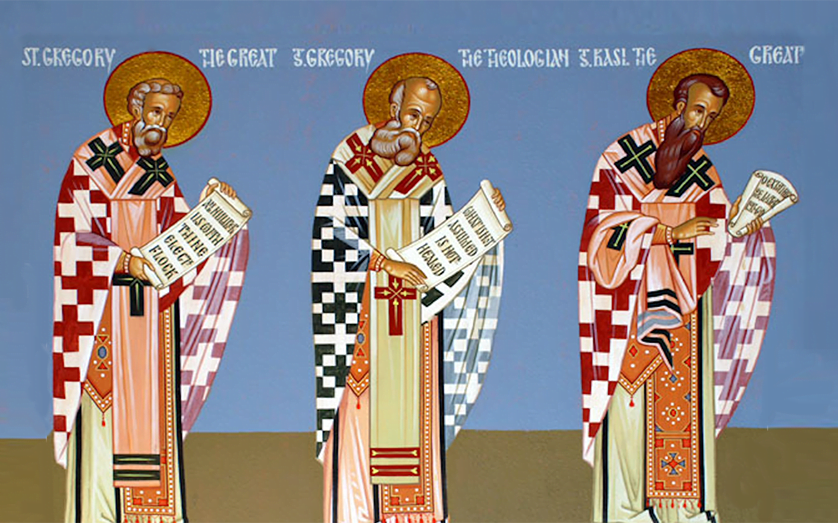WARNING: TODAY’S CHRISTMAS DEVOTIONAL CONTAINS ITEMS OF AN UNBELIEVABLE GEEKY THEOLOGICAL NATURE. PROCEED AT GREAT RISK TO YOUR SOCIAL STANDING AND COMFY CHRISTMAS TRADITIONS….
Break out the fruitcake, chocolate, and perhaps an adult holiday drink of choice as we plunge into some deeper Incarnational water today dear readers. If you get spooked, then just revert to an earlier Advent devotional about honey or figs okay?! Today…we ask how, what and why!!

Christian Theology was once called the Queen of Sciences, the head of any rigorous philosophical, academic and even scientific pursuit to better comprehend the mind of God, what medieval theologian Anselm of Canterbury once called fides quaerens intellectum, faith seeking understanding. As I ponder the mysteries of Nativity and Incarnation, I wonder…why? What is God up to? How does the birth of Jesus fit into God’s greater salvific plan?
Two alluring challenges to the Christian gospel existed in those first several hundred years the church was struggling to articulate her faith and survive. Countless martyrs died defending the Body of Christ against these two seemingly oppositional challenges. The first challenge: Jesus was not truly and fully divine, and therefore not really God but rather some kind of demi-god or what we call today a superhero. The second challenge, as you might anticipate: Jesus was so much God he was never fully human and therefore unable to experience what we do. I find this second even more pernicious than the first because in this second challenge Jesus becomes an accomplished stage actor mimicking a humanity he wore like a coat in cold weather. Against both stood Nicene orthodoxy (which is why the Nicene Creed spends so much time on this point…God from God, Light from Light, true God from true God, begotten never created) and some monkish, mystical Christian heroes we call the Cappadocian Fathers. It was this group of theological heavy hitters who first wrote, What He did not assume, he could not redeem (or perhaps heal is a better translation). Jesus was both fully divine, the Second Person of the triune Godhead, and fully human, Jesus of Nazareth, the Fathers wrote and taught in the face of tremendous opposition. He had to inhabit the entirety of human existence (they called it assuming humanity) to redeem it (heal the breach between God and us), and that meant a supernatural birth, a gruesome natural physical death and uber-supernatural resurrection from death into new and enduring life with God forever.
But why?! Is there no easier way for God to say, Hey you really mucked that up! Why don’cha just pull up stakes and come back home with me? For me, here is where early Christian theology shines so brightly! While western Christianity (that’s us folks) went into more academic rationalism, Eastern Christianity embraced theosis, a complete transformation to fully reflect God’s nature and purpose in our lives. Theosis and its cousin theoria (direct spiritual connection to God through prayer) are only possible by God’s Incarnation (stay with me dear readers!); superstar early theologian Irenaeus taught “the Word of God, our Lord Jesus Christ, Who did, through His transcendent love, become what we are, that He might bring us to be even what He is Himself.” Is it truly possible to be unified with God for ordinary folks like you and me?! Is the Christmas and Easter plan to unite us not only with each other but to bind each of us to God in the most intimate way possible? Not after death, but…right…now?! No Christmas, then no bridge, no tether, no connective ligamental tissue between a holy God and a fallen humanity. Christmas is the gateway to a new humanity set right with God. Swimming in the deep end of the Incarnational pool!
- Of course the Roman Catholic church and the Protestant Reformers weren’t entirely keen on all this theosis business, preferring the sin/confession/absolution/indulgence/salvation through grace theological complex instead. If anyone is still reading, do some web searching and reviewing of theosis and draw your own conclusions.
- And your theological reflection please? What is God up to in this Christmas/Nativity/Incarnation story then? And why?
- Good theology follows upon and integrates personal experience. This has happened, and so what does that mean to me? How does that impact my life? And so how does Christmas directly impact your life and your life of faith also? I will nudge you to be specific here. How does the babe in the manger impact/influence/captivate your life today?